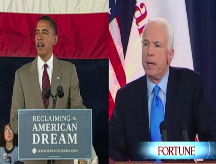Pushing for a Fed rate hike...now
The Federal Reserve has been talking tough about inflation and the weak dollar. But some want action sooner rather than later.


NEW YORK (CNNMoney.com) -- The Federal Reserve is starting to talk tough about inflation. But is there any substance backing up these words?
Last week, Fed chairman Ben Bernanke took the bold step of explicitly supporting a stronger dollar.
Yesterday, Federal Reserve Bank of New York president Timothy Geithner said following a speech in New York that "tighter monetary policy" from central banks around the globe may be needed.
And last night, at a speech in Boston, Bernanke hinted that the Fed's rate-cutting campaign has come to a close.
Bernanke said "the latest round of increases in energy prices has added to the upside risks to inflation and inflation expectations." He added that the Fed "will strongly resist an erosion of longer-term inflation expectations."
All that suggests that the Fed may be starting to consider interest rate hikes later this year. That would help support the dollar and contain inflation. But some think that the sooner the Fed acts the better and that the Fed needs to do more than just talk.
Several economists and market strategists have blamed the Fed's series of seven rates cuts since last September for weakening the greenback against the euro and leading to the spike in commodity prices.
The Fed's benchmark federal funds rate is now 2%. By way of comparison, the European Central Bank's main interest rate has held steady at 4% since last June.
As long as U.S. interest rates are relatively low, some believe that the dollar will just continue to weaken against the euro and that oil prices will keep climbing.
The big spike in oil at the end of last week was largely attributed to comments by Jean-Claude Trichet, the president of the European Central Bank, suggesting that the ECB may boost rates by a "small amount" at its next meeting to fight inflation.
So where does this leave the Fed? At the very least, it's going to need to send an even stronger signal to the market following the conclusion of its next policy meeting on June 25 that interest rates will head higher in the near-term.
"It is a problem having Europe's rates high and our rates low. It puts a lot of pressure on the dollar," said Alan Skrainka, chief market strategist with Edward Jones. "Enough is enough. I don't want to second guess the chairman of the Federal Reserve but they've cut rates enough. It would be problematic if they cut rates more."
However, there is a small, but growing, school of Fed watchers who think the Fed should shock the markets and raise rates at its next meeting.
As of this morning, traders were pricing in a 12% chance of a quarter-point rate increase, according to federal funds futures listed on the Chicago Board of Trade. That's up from a 6% probability just yesterday.
To be sure, a rate hike in the next few weeks would be a major shift from the Fed's usual way of dealing with rate hikes. The central bank typically likes to telegraph moves well in advance in order to avoid shocking Wall Street.
But with crude oil hovering around $136 a barrel, maybe a big shock is exactly the right medicine.
"If the Fed raised rates this month, you'd see a market sell-off but you'd also see the dollar strengthen and commodities fall," Haag Sherman, managing director with Salient Partners, an asset managing subsidiary of Sanders Morris Harris.
"The Fed has been undercutting the dollar for six to nine months. The ECB has more credibility than our Fed does. They are doing what a Fed should do, which is ensuring that there isn't runaway inflation," Sherman added.
Still, the chances of a rate hike at the end of the month are exceedingly slim, especially after Friday's shocker of a jobs report. Skrainka thinks that a rate increase is still several months away.
"The employment report put rate hike talks on hold. Now, the Fed just needs to show that it's done cutting rates. But you don't go from one rate cut after another to suddenly hiking rates. People need to be patient," he said.
Sherman thinks the time for talk is done though.
"At some point, rhetoric doesn't do the trick. You have to actually follow through with policy. So even though it might be painful to raise rates, it's the right thing to do," he said. "The Fed should be scared to death of inflation based on commodity prices."
Issue #1 - America's Money: All this week at noon ET, CNN explains how the weakening economy affects you. Full coverage.
Gas prices have climbed to record levels. Are you feeling the pinch? Tell us how gas prices are affecting you and what you're doing to cope. Send us your photos and videos, or email us and tell us what you think. ![]()




